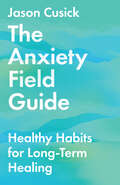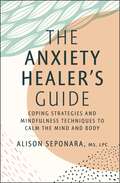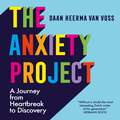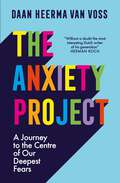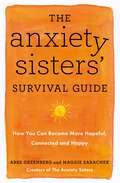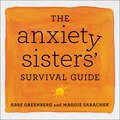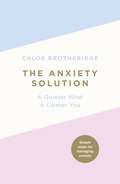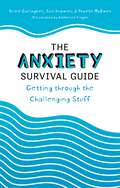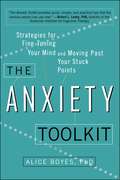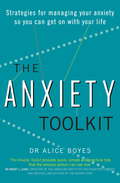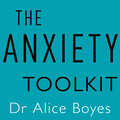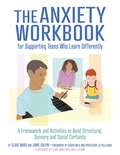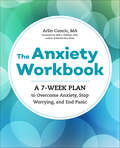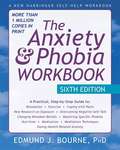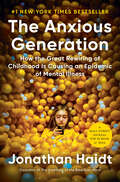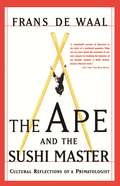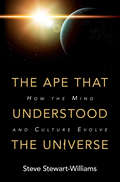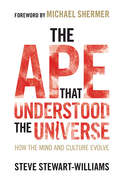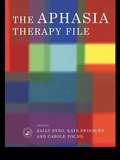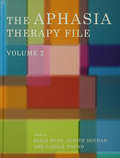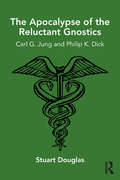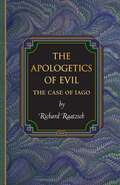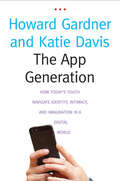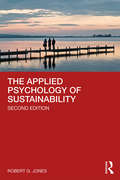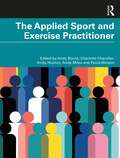- Table View
- List View
The Anxiety Field Guide: Healthy Habits for Long-Term Healing
by Jason CusickAnxiety is one of the most pressing mental health issues of our day.The Anxiety Field Guide
The Anxiety Healer's Guide: Coping Strategies and Mindfulness Techniques to Calm the Mind and Body
by Alison SeponaraDiscover practical, natural, on-the-go solutions for combating anxiety with this must-have guide.How can you begin holistically tackling your anxiety whenever the moment strikes? In The Anxiety Healer&’s Guide licensed counselor and creator of the Instagram account @TheAnxietyHealer Alison Seponara brings her expertise and commitment to healing anxiety to the world. While the journey toward recovery might look different for everyone, this portable resource is full of concrete activities, tools, and techniques that have been scientifically proven to calm the sympathetic (fight-or-flight) nervous system and give sufferers a better sense of control over their minds and bodies. This comprehensive, easy-to-use guide includes everything you need to help holistically treat your anxiety and create your own anxiety-healing tool kit, including: -Body breakthroughs -Mind tricks to ease anxiety -Breathing techniques -Grounding strategies -Distraction ideas -Cognitive-behavioral actions -Natural remedies -Gut-health practices -Positive affirmations -On-the-go activities -And more! This is an essential read for anyone who&’s tired of living with anxiety and looking for helpful solutions they can apply anytime, anywhere.
The Anxiety Project
by Daan Heerma VossA personal journey into the roots of anxiety, through science, history, literature and the classics.---"The most interesting Dutch writer of his generation" Herman Koch"Vivid and moving. A marvellous hybrid of a book about one one of the major contemporary causes of sickness and unhappiness. In it we recognise ourselves, our restlessness and insecurity" George Szirtes--- Something inside will not let me be . . . Daan Heerma van Voss is not just anxious. According to tests on the cortisone levels in his hair, he is seventy-four times as anxious as the average person. And that makes him hard to live with. When another relationship is broken by his crippling fears, the only way to cope is to get to the roots of his condition. But he also wants to dig deeper and tackle the big questions. Why are 264 million people worldwide suffering from anxiety, and why is this number growing every day? Is it hereditary? Is there a link with creativity? And how can you love when you're living in a constant state of fear? In his quest for answers, he takes us on a profoundly moving journey from his apartment in Amsterdam to France, Jakarta and San Francisco. Along the way we'll meet philosophers, artists, writers and other fascinating individuals from around the world. But this is also a journey through literature, the classics, the history of anxiety and the science behind it. Timely, learned and heartfelt, The Anxiety Project fuses the sharp musings of a curious mind with a raw and honest dissection of a relationship undercut by fear. It will appeal to anyone trying to remain calm on our very nervous planet.Translated from the Dutch by David Doherty(P)2023 Quercus Editions Limited
The Anxiety Project
by Daan Heerma Voss"The most interesting Dutch writer of his generation" Herman Koch"Vivid and moving. A marvellous hybrid of a book about one of the major contemporary causes of sickness and unhappiness. In it we recognise ourselves, our restlessness and insecurity" George SzirtesSomething inside will not let me be . . . Daan Heerma van Voss is not just anxious. According to tests on the cortisone levels in his hair, he is seventy-four times as anxious as the average person. And that makes him hard to live with. When another relationship is broken by his crippling fears, the only way to cope is to get to the roots of his condition. But he also wants to dig deeper and tackle the big questions. Why are 264 million people worldwide suffering from anxiety, and why is this number growing every day? Is it hereditary? Is there a link with creativity? And how can you love when you're living in a constant state of fear? In his quest for answers, he takes us on a profoundly moving journey from his apartment in Amsterdam to France, Jakarta and San Francisco. Along the way we'll meet philosophers, artists, writers and other fascinating individuals from around the world. But this is also a journey through literature, the classics, the history of anxiety and the science behind it. Timely, learned and heartfelt, The Anxiety Project fuses the sharp musings of a curious mind with a raw and honest dissection of a relationship undercut by fear. It will appeal to anyone trying to remain calm on our very nervous planet.Translated from the Dutch by David Doherty
The Anxiety Sisters' Survival Guide: How You Can Become More Hopeful, Connected, and Happy
by Abbe Greenberg Maggie Sarachek* Does merely saying the word 'anxiety' make you anxious? [sorry]* Is your head stuck in a constant spin cycle? * Do you feel like your anxiety runs the show? [sorry, again]Got anxiety? Join the club. More specifically, join the Anxiety Sisterhood. Abs and Mags, aka the Anxiety Sisters, have spent the past thirty years figuring out how to outsmart their anxiety-ridden brains, and the last five years sharing what they've learned with a growing online community of like-minded sufferers who are looking for ways to cope better every day.Whether you're looking to better understand and manage panic, worry, grief, stress or phobias, or just want to pause the endless churning in your head, you'll find real-world, relatable, research-based techniques, exercises, and insights - without the clinical, one-size-fits-all approach that isn't helpful when your mind is racing, your triggers are in overdrive, and you just want to get back to feeling normal (you'd settle for normal-ish, tbh).Most of all, this is a handbook for fighting Shrinking World Syndrome - that isolating, lonely feeling that comes from letting your anxiety run the show. The stories and suggestions in this book will remind you that you're not alone. You don't have to eliminate anxiety from your life in order to feel okay and maybe even (whisper it) happy.
The Anxiety Sisters' Survival Guide: How You Can Become More Hopeful, Connected, and Happy
by Abbe Greenberg Maggie Sarachek* Does merely saying the word 'anxiety' make you anxious? [sorry]* Is your head stuck in a constant spin cycle? * Do you feel like your anxiety runs the show? [sorry, again]Got anxiety? Join the club. More specifically, join the Anxiety Sisterhood. Abs and Mags, aka the Anxiety Sisters, have spent the past thirty years figuring out how to outsmart their anxiety-ridden brains, and the last five years sharing what they've learned with a growing online community of like-minded sufferers who are looking for ways to cope better every day.Whether you're looking to better understand and manage panic, worry, grief, stress or phobias, or just want to pause the endless churning in your head, you'll find real-world, relatable, research-based techniques, exercises, and insights - without the clinical, one-size-fits-all approach that isn't helpful when your mind is racing, your triggers are in overdrive, and you just want to get back to feeling normal (you'd settle for normal-ish, tbh).Most of all, this is a handbook for fighting Shrinking World Syndrome - that isolating, lonely feeling that comes from letting your anxiety run the show. The stories and suggestions in this audiobook will remind you that you're not alone. You don't have to eliminate anxiety from your life in order to feel okay and maybe even (whisper it) happy.(P) 2021 Penguin Audio
The Anxiety Solution: A Quieter Mind, a Calmer You
by Chloe BrotheridgeFind your fresh start by learning how to cope with anxiety and become a calmer, happier and more grounded person with this simple and accessible guide'Remarkable, pioneering, could change your life' Daily Mail_______This is a book for anyone experiencing anxiety, guiding you through simple ways to ease panic, dread and fear in the uncertainty of modern life.The Anxiety Solution is a simple and inspiring guide to reducing anxiety from former sufferer and qualified clinical hypnotherapist, and host of The Calmer You podcast, Chloe Brotheridge.Chloe will help you understand why we feel anxious and will equip you with techniques to help manage the symptoms and start living a happier, more confident life.Based on the latest scientific research and her unique programme which has already helped hundreds of clients, The Anxiety Solution will show you how to regain control of your life.'I know what it's like to be stuck in a cycle of anxiety. I used to feel as though fear and worry were a permanent part of who I was . . . but I'm here to tell you that it doesn't have to be this way. The truth is, your natural state is one of calmness and confidence - and I'm going to teach you how to get there.'If you want to spend less time worrying, this book is the solution for you. You'll be surprised how quickly you can be back in control and able to enjoy your life once again._______Discover the impact The Anxiety Solution has had on readers:'As an anxiety sufferer who has tried medication and counselling I never truly felt that anyone understood exactly what I was feeling . . . until I ordered this book! It has changed the way I look at life, and I wish I'd have found it sooner' 5***** Reader Review'Inspiring, educational and informative. If you are somebody looking for solutions to your health, wellbeing and happiness, this book is for you. Could not recommend highly enough' 5***** Reader Review'Putting into practice what is written in this book has made me one million times more positive in my thinking than I ever was' 5***** Reader Review'Chloe offers realistic advice and methods that have helped me to co-exist with my anxiety in a way I never thought I could' 5***** Reader Review
The Anxiety Survival Guide: Getting through the Challenging Stuff
by Sue Knowles Bridie Gallagher Phoebe McEwenCo-written with psychologists and a college student who has experienced anxiety herself, this is a relatable and straightforward guide to managing worry in emerging adulthood. As well as providing tried-and-tested advice and exercises that are proven to reduce feelings of anxiety, it includes recovery stories from people who have managed their symptoms successfully. It begins with what is difficult and challenging about young adulthood and how you can deal with uncertainty in life. It goes on to examine change and challenges, giving tips about what can help in specific scenarios such as exams, relationships, leaving home and interviews. The guide also includes strategies and techniques for coping with panic attacks; self-care; and calming your mind.The guide uses a range of evidence-based approaches, including CBT, DBT, Compassion Focused Approaches and Mindfulness so you can work out the techniques that are best for you. The signposting included throughout guides young adults towards further support. This is essential reading for any young person experiencing anxiety, worry or going through a difficult transition or stressful experience.
The Anxiety Toolkit: Strategies for Fine-Tuning Your Mind and Moving Past Your Stuck Points
by Alice BoyesDo you overthink before taking action? Are you prone to making negative predictions? Do you worry about the worst that could happen? Do you take negative feedback very hard? Are you self-critical? Does anything less than perfect performance feel like failure?If any of these issues resonate with you, you're probably suffering from some degree of anxiety, and you're not alone. The good news: while reducing your anxiety level to zero isn't possible or useful (anxiety can actually be helpful!), you can learn to successfully manage symptoms - such as excessive rumination, hesitation, fear of criticism and paralysing perfection.In The Anxiety Toolkit, Dr. Alice Boyes translates powerful, evidence-based tools used in therapy clinics into tips and tricks you can employ in everyday life. Whether you have an anxiety disorder, or are just anxiety-prone by nature, you'll discover how anxiety works, strategies to help you cope with common anxiety 'stuck' points and a confidence that - anxious or not - you have all the tools you need to succeed in life and work.From the Trade Paperback edition.
The Anxiety Toolkit: Strategies for managing your anxiety so you can get on with your life
by Dr Alice BoyesDo you overthink before taking action? Are you prone to making negative predictions? Do you worry about the worst that could happen? Do you take negative feedback very hard? Are you self-critical? Does anything less than perfect performance feel like failure?If any of these issues resonate with you, you're probably suffering from some degree of anxiety, and you're not alone. The good news: while reducing your anxiety level to zero isn't possible or useful (anxiety can actually be helpful!), you can learn to successfully manage symptoms - such as excessive rumination, hesitation, fear of criticism and paralysing perfection.In The Anxiety Toolkit, Dr Alice Boyes translates powerful, evidence-based tools used in therapy clinics into tips and tricks you can employ in everyday life. Whether you have an anxiety disorder, or are just anxiety-prone by nature, you'll discover how anxiety works, strategies to help you cope with common anxiety 'stuck' points and a confidence that - anxious or not - you have all the tools you need to succeed in life and work.
The Anxiety Toolkit: Strategies for managing your anxiety so you can get on with your life
by Dr Alice BoyesDo you overthink before taking action? Are you prone to making negative predictions? Do you worry about the worst that could happen? Do you take negative feedback very hard? Are you self-critical? Does anything less than perfect performance feel like failure?If any of these issues resonate with you, you're probably suffering from some degree of anxiety, and you're not alone. The good news: while reducing your anxiety level to zero isn't possible or useful (anxiety can actually be helpful!), you can learn to successfully manage symptoms - such as excessive rumination, hesitation, fear of criticism and paralysing perfection.In The Anxiety Toolkit, Dr Alice Boyes translates powerful, evidence-based tools used in therapy clinics into tips and tricks you can employ in everyday life. Whether you have an anxiety disorder, or are just anxiety-prone by nature, you'll discover how anxiety works, strategies to help you cope with common anxiety 'stuck' points and a confidence that - anxious or not - you have all the tools you need to succeed in life and work.
The Anxiety Workbook for Supporting Teens Who Learn Differently: A Framework and Activities to Build Structural, Sensory and Social Certainty
by Clare Ward James GalpinThe teenage years are associated with high levels of uncertainty and anxiety, compounded by academic and social demands, and physical and emotional changes. They can be especially tough for teenagers who learn differently.This workbook contains a host of practical activities for teachers and other adults supporting young people with learning differences, whether at home or in the classroom. Drawing on their years of first hand experience, and up to the minute research, the authors outline a trans-diagnostic framework for identifying what might be behind a student's behaviour. They show how the first crucial step all practitioners must take is to work out what could be causing a teen's feelings of anxiety or uncertainty, and how this can be addressed. The activities in this workbook are organised into three sections, each addressing one of the three key areas where anxiety or uncertainty can be found: the structural, sensory and social domains. The tried-and-tested worksheets and activities present a much-needed alternative to a diagnosis-led approach. They can be used with any teenager, with or without a diagnosis, in classroom settings, intervention groups, or one to one work. The Anxiety Workbook will help you to really understand and address the needs of the SEN students you support, thereby improving their well-being, confidence and self-esteem and empowering them to get the most out of their education.
The Anxiety Workbook: A 7-Week Plan to Overcome Anxiety, Stop Worrying, and End Panic
by Arlin CuncicYou're just 7 weeks away from overcoming your anxiety Whether it takes the form of full-blown panic or chronic worry, anxiety can limit the potential of every aspect of your life. Regain control with help from The Anxiety Workbook, a simple, 7-week plan that gives you the tools you need to manage your anxiety so you can feel and function at your best again.You'll learn how to set clear goals, identify and change unhelpful thoughts, and practice new behaviors to diminish the power anxiety has over you. Each week explores a different topic, with cumulative lessons that offer a straightforward path to success. It's time to get free from the obstacles holding you back, break away from negative thought patterns, and alleviate your anxiety over the long term.This anxiety and phobia workbook includes:An easy pace—Take anxiety management at your own pace with exercises that challenge you and address your concerns without stressing you out.A proactive approach—Explore hands-on ways to relieve anxiety with simple, actionable checklists, writing exercises, activities, and more.An evidence-based method—Discover research-supported information and exercises based in cognitive behavioral therapy (CBT).Take the reins of your life back with The Anxiety Workbook.
The Anxiety and Phobia Workbook
by Edmund J. BourneNow in its sixth edition and recommended by therapists worldwide, The Anxiety and Phobia Workbook has been the unparalleled, essential resource for people struggling with anxiety and phobias for almost thirty years. Living with anxiety, panic disorders, or phobias can make you feel like you aren't in control of your life. If you're ready to tackle the fears that hold you back, this book is your go-to guide. Packed with the most effective skills for assessing and treating anxiety, this evidence-based workbook contains the latest clinical research. You'll develop a full arsenal of skills for quieting fears and taking charge of your anxious thoughts. Written by a leading expert in cognitive behavioral therapy (CBT) and a classic in its field, this fully revised edition offers powerful, step-by-step treatment strategies for panic disorders, agoraphobia, generalized anxiety disorder (GAD), obsessive-compulsive disorder (OCD), post-traumatic stress disorder (PTSD), worry, and fear. You will also find updated information compatible with the DSM-V, as well as current information on medications and treatment, nutrition, mindfulness training, exposure therapy, and the latest research in neurobiology. Whether you suffer from anxiety and phobias yourself, or are a professional working with this population, this book will provide the latest treatment solutions for overcoming the fears that stand in the way of living a full, happy life. This workbook can be used on its own or as a supplement to therapy.
The Anxious Generation: How the Great Rewiring of Childhood Is Causing an Epidemic of Mental Illness
by Jonathan HaidtFrom New York Times bestselling coauthor of The Coddling of the American Mind, an essential investigation into the collapse of youth mental health—and a plan for a healthier, freer childhood. <p><p> After more than a decade of stability or improvement, the mental health of adolescents plunged in the early 2010s. Rates of depression, anxiety, self-harm, and suicide rose sharply, more than doubling on many measures. Why? <p><p> In The Anxious Generation, social psychologist Jonathan Haidt lays out the facts about the epidemic of teen mental illness that hit many countries at the same time. He then investigates the nature of childhood, including why children need play and independent exploration to mature into competent, thriving adults. Haidt shows how the “play-based childhood” began to decline in the 1980s, and how it was finally wiped out by the arrival of the “phone-based childhood” in the early 2010s. He presents more than a dozen mechanisms by which this “great rewiring of childhood” has interfered with children’s social and neurological development, covering everything from sleep deprivation to attention fragmentation, addiction, loneliness, social contagion, social comparison, and perfectionism. He explains why social media damages girls more than boys and why boys have been withdrawing from the real world into the virtual world, with disastrous consequences for themselves, their families, and their societies. <p><p> Most important, Haidt issues a clear call to action. He diagnoses the “collective action problems” that trap us, and then proposes four simple rules that might set us free. He describes steps that parents, teachers, schools, tech companies, and governments can take to end the epidemic of mental illness and restore a more humane childhood. <p><p> Haidt has spent his career speaking truth backed by data in the most difficult landscapes—communities polarized by politics and religion, campuses battling culture wars, and now the public health emergency faced by Gen Z. We cannot afford to ignore his findings about protecting our children—and ourselves—from the psychological damage of a phone-based life. <p> <b>New York Times Bestseller</b>
The Ape and the Sushi Master Reflections of A Primatologist: Cultural Reflections Of A Primatologist
by Frans De WaalWhat if apes had their own culture rather than an imposed human version? What if they reacted to situations with behavior learned through observation of their elders (culture) rather than with pure genetically coded instinct (nature)? In answering these questions, eminent primatologist Frans de Waal corrects our arrogant assumption that humans are the only creatures to have made the leap from the natural to the cultural domain. The book's title derives from an analogy de Waal draws between the way behavior is transmitted in ape society and the way sushi-making skills are passed down from sushi master to apprentice. Like the apprentice, young apes watch their group mates at close range, absorbing the methods and lessons of each of their elders' actions. Responses long thought to be instinctive are actually learned behavior, de Waal argues, and constitute ape culture. A delightful mix of intriguing anecdote, rigorous clinical study, adventurous field work, and fascinating speculation, The Ape and the Sushi Master shows that apes are not human caricatures but members of our extended family with their own resourcefulness and dignity.
The Ape that Understood the Universe: How the Mind and Culture Evolve
by Steve Stewart-WilliamsThe Ape that Understood the Universe is the story of the strangest animal in the world: the human animal. It opens with a question: How would an alien scientist view our species? What would it make of our sex differences, our sexual behavior, our child-rearing patterns, our moral codes, our religions, our languages, and science? The book tackles these issues by drawing on ideas from two major schools of thought: evolutionary psychology and cultural evolutionary theory. The guiding assumption is that humans are animals, and that like all animals, we evolved to pass on our genes. At some point, however, we also evolved the capacity for culture - and from that moment, culture began evolving in its own right. This transformed us from a mere ape into an ape capable of reshaping the planet, travelling to other worlds, and understanding the vast universe of which we're but a tiny, fleeting fragment.
The Ape that Understood the Universe: How the Mind and Culture Evolve
by Steve Stewart-WilliamsThe Ape that Understood the Universe is the story of the strangest animal in the world: the human animal. It opens with a question: How would an alien scientist view our species? What would it make of our sex differences, our sexual behavior, our altruistic tendencies, and our culture? The book tackles these issues by drawing on two major schools of thought: evolutionary psychology and cultural evolutionary theory. The guiding assumption is that humans are animals, and that like all animals, we evolved to pass on our genes. At some point, however, we also evolved the capacity for culture - and from that moment, culture began evolving in its own right. This transformed us from a mere ape into an ape capable of reshaping the planet, travelling to other worlds, and understanding the vast universe of which we're but a tiny, fleeting fragment. Featuring a new foreword by Michael Shermer.
The Aphasia Therapy File: Volume 1
by Carole Pound Sally Byng Kate SwinburnDifferent from a textbook or academic journal, the File represents a collection of explicit descriptions about therapy interventions written by practitioners themselves. The description of the rationale for the therapy, the intervention itself and evaluation of outcomes are of paramount importance. Each contributor guides the reader through the thinking that they engaged in as they decided what to do, often with considerable frankness about the difficulties involved. The File will be of equal value to experienced practitioners and students alike.
The Aphasia Therapy File: Volume 2
by Carole Pound Judith Duchan Sally ByngThe Aphasia Therapy Files represent a practical resource for people who work with individuals with aphasia, either as therapists or as researchers. An overview of issues associated with current practices is combined with a study of the practicalities of determining, designing and implementing therapies. This second volume continues to explore the possibility of bridging the gap between therapy in a clinical setting and the practical issues faced by the person living with aphasia. Each author presents one or more of their clinical practices in order to share their therapy experiences and reasoning with others. These contributions provide an insight into the complex issues that face both the practitioner and the person with aphasia, including discussion of subjects such as: Revealing competence and rethinking identity for people with severe aphasia using drawing and a communication book Respecting the rights of a person with aphasia to their own life choices: a longitudinal therapy study A group approach to the long-term rehabilitation of people with acquired head injury within the community Lexical and functionally based treatment: effects on word retrieval and conversation While each of the chapters is of considerable interest on its own, the final chapter offers readers a method of describing and capturing what happens in therapy and why, to enable comparisons between therapies and application by readers themselves. Written by speech and language therapists working in clinical practice, the studies included in this unique resource reflect the realities of everyday practice and will appeal to therapists, students and researchers in aphasia.
The Apocalypse of the Reluctant Gnostics: Carl G. Jung and Philip K. Dick
by Stuart DouglasThis book presents a comparison of the Gnostic worldviews of Carl G. Jung and science-fiction author, Philip K. Dick, two figures who have done far more than most to revive an interest in the Gnostic tradition in the modern world. Despite profoundly different approaches - one was a depth psychologist whose unique insights and approach to psychology forced him to explore the depths of the unconscious in a way that inevitably led him to touch frequently on metaphysical or spiritual matters; the other was an author of science-fiction - there are some striking parallels between their unique Gnostic visions. With the relatively recent publication of both Jung's and Dick's personal journals - The Red Book (2009), and, The Exegesis of Philip K. Dick (2011), respectively - in which they articulate their Gnostic visions, it seems timely to make this comparison.
The Apologetics of Evil: The Case of Iago (Princeton Monographs in Philosophy #26)
by Richard RaatzschThis book is a concise philosophical meditation on Iago and the nature of evil, through the exploration of the enduring puzzle found in Shakespeare's Othello. What drives Iago to orchestrate Othello's downfall? Instead of treating Iago's lack of motive as the play's greatest weakness, The Apologetics of Evil shows how this absence of motive is the play's greatest strength. Richard Raatzsch determines that Iago does not seek a particular end or revenge for a discrete wrong; instead, Iago is governed by a passion for intriguing in itself. Raatzsch explains that this passion is a pathological version of ordinary human behavior and that Iago lacks the ability to acknowledge others; what matters most to him is the difference between himself and the rest of the world. The book opens with a portrait of Iago, and considers the nature and moral significance of the evil that he represents. Raatzsch addresses the boundaries dividing normality and pathology, conceptualizing evil as a pathological form of the good or ordinary. Seen this way, evil is conceptually dependent on the ordinary, and Iago, as a form of moral monster, is a kind of nonbeing. Therefore, his actions might be understood and defended, even if they cannot be justified. In a brief epilogue, Raatzsch argues that literature's presentation of what is monstrous or virtuous can constitute an understanding of these concepts, not merely illustrate them.
The App Generation
by Katie Davis Howard GardnerNo one has failed to notice that the current generation of youth is deeply--some would say totally--involved with digital media. Professors Howard Gardner and Katie Davis name today's young people The App Generation, and in this spellbinding book they explore what it means to be "app-dependent" versus "app-enabled" and how life for this generation differs from life before the digital era. Gardner and Davis are concerned with three vital areas of adolescent life: identity, intimacy, and imagination. Through innovative research, including interviews of young people, focus groups of those who work with them, and a unique comparison of youthful artistic productions before and after the digital revolution, the authors uncover the drawbacks of apps: they may foreclose a sense of identity, encourage superficial relations with others, and stunt creative imagination. On the other hand, the benefits of apps are equally striking: they can promote a strong sense of identity, allow deep relationships, and stimulate creativity. The challenge is to venture beyond the ways that apps are designed to be used, Gardner and Davis conclude, and they suggest how the power of apps can be a springboard to greater creativity and higher aspirations.
The Applied Psychology of Sustainability
by Robert G. JonesWhy doesn’t everyone see sustainability as a huge issue? Why don’t people think more carefully before making choices? What will it take for people to change? Examining the many psychological factors that lead to human behavioral effects on the environment, this book answers these questions definitively and provides practical guidance for approaches that have been used to successfully stimulate change. The Applied Psychology of Sustainability provides an extensive, integrated definition of the processes that lead to climatic, ecological, and socio-economic results: It defines a Psychology of Sustainability. Each chapter applies elements from the core research areas of cognitive, social, and developmental psychology into the context of criteria specific to sustainability. Comprehensively updated to embrace great change in the field, this new edition expands on critical issues yet maintains its strong foundation that the psychology of decisions is the essential precursor to sustainability and that these decisions should be treated as the primary target of change. Throughout the book, readers will find new ways of framing questions related to human adaptability and evolutionary psychology. The Applied Psychology of Sustainability is essential reading for students and professionals in a range of disciplines who wish to contribute to this crucial conversation.
The Applied Sport and Exercise Practitioner
by Charlotte Chandler Andy Miles Andy Borrie Andy Hooton Paula WatsonThe Applied Sport and Exercise Practitioner is designed to help all developing sport and exercise practitioners navigate the world of applied work. This book explores conceptual issues surrounding applied practice such as the identity and role of the applied practitioner, professional ethics and how to be part of a multi-disciplinary team. Using a cross disciplinary approach, it brings together the challenges and experiences of sport and exercise practitioners. This book links theoretical ideas with actual practice and compares issues across disciplines and domains. Each chapter includes case studies of contemporary issues from practitioners working in different environments and with diverse populations. Important topics such as insurance, data protection, ethic and soft skills are also discussed. The Applied Sport and Exercise Practitioner is key reading for graduate students and practitioners interested in improving their practice and careers.
